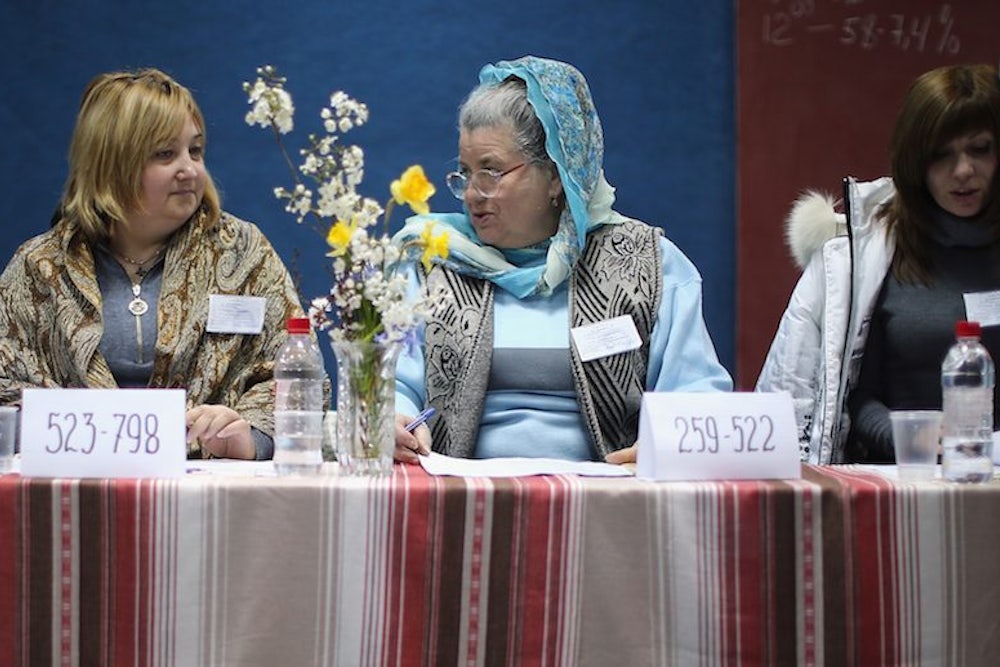I live in Britain, and the preparations for Scotland’s vote on independence seem to have been going on forever. Every issue has been discussed—banks, pensions, currency, nuclear weapons—and the Scots don’t even vote until September.
How refreshing, therefore, to come to Crimea, where they only set the referendum date on March 6 and it has already happened. The world’s electoral authorities are surely watching in awe: How is it possible to arrange a referendum so quickly? What is the secret of the Crimeans’ success? Can we repeat it in our own countries?
The answer to that last question is: Yes, if you follow these three simple steps.
First, think about the words on the ballot paper. Crimea avoided the yes/no dichotomy traditionally favoured by referendum organisers, and offered instead two options: Do you want to join Russia? Or do you want to make Crimea independent, by returning to the (abortive) constitution of 1992?
Since there is no sign that anyone in Crimea wants to be independent, that is actually one option, with no way of voting against it. The ballot boxes are transparent, and I have seen hundreds of ballot papers. All but one was marked in favor of Russia (in the one exception, the voter accidentally ticked both boxes). Had the voters been given the chance of voting to stay in Ukraine, there was a risk they might have chosen it. The phrasing of the question is crucial, that’s lesson number one.
Onto the second secret of Crimea’s success: You need a good strong lead from the government. You can’t get into Parliament in the capital, Simferopol, to ask officials how to vote, because it’s ringed by non-communicative Russian Cossacks with whips. But asking isn’t necessary. There is a Russian flag flying from the roof, and a huge Russian flag in the courtyard. In case the voters missed that message, billboards giving the date of the referendum and proclaiming Crimea to be “together with Russia” line the peninsula’s highways.
Some polling stations—such as the one in the village of Arpat—have helpfully laid out campaign literature. One leaflet had a BuzzFeed-style list of “10 reasons to be together with Russia.” These ranged from the spiritual (“In our many centuries of history, tens of thousands of sons of Russia have sacrificed their heads to give [Crimea] freedom”) to the practical (“Pensions in Russia are almost twice as high as in Ukraine”) to the rhetorical (“Today the people of Crimea have the chance to restore historical justice”).
There were no leaflets supportive of the constitution of 1992, incidentally.
There is of course a risk that, if you rush through a referendum in 10 days asking a clearly leading question, and without the permission of the central government, people outside your country may question its legitimacy. To help deal with this problem you need international observers, and once again Crimea has shown the way. That’s lesson number three.
The place to find observers is in Europe, where the multiple levels of administration—local, regional, national, European—provide a glut of people with impressive-sounding titles and a lot of time on their hands. I shared a plane into Simferopol with several members of the Flemish parliament, who equated Crimea’s referendum with their own desire to shed the chafing Belgian yoke.
“If it’s legal or illegal does not matter because every nation has the right to say that it can be independent. When a nation wants to be independent or wants to go on its own, we must allow it to,” said Frank Creyelman, as we waited to board in Moscow.
He said he had been invited to observe the poll by an organisation called EODE, though he couldn’t remember what the acronym stands for—“Eurasian Democracy something something.”
The letters EODE actually stand for Eurasian Observatory for Democracy and Elections, and it declares on its website that it shares the values of “the current Russian leadership and V.V. Putin.” It had apparently managed to persuade a whole group of European nonentities that it was a respectable organisation, however, including Fabrizio Bertot, an Italian member of the European Parliament. “I’m not in charge of them, they just invited me. I know just the name, that’s enough. It’s the Eurasian Observatory, so I’m here to observe,” he told me after giving a press conference to a thicket of Russian television cameras.
And what was the conclusion of his observation?
“The conditions in which this referendum is being done are completely democratic,” he told a Russian television channel, while I eavesdropped.
The leaders of the Tatars, who make up just 15 percent of Crimea’s population, although they are its aboriginal inhabitants, have declared a boycott, saying the referendum is unconstitutional—a position shared by every government in the world except Russia, Syria, and North Korea.
In a polling station in a school in the mainly Tatar region of Kamenka, local officials declined to tell me how many people had come to vote, and explained away the fact that not a single person came in during the half-hour I was there.
“It’s just that it’s lunchtime so there is no one here. Besides, today is Sunday so people are relaxing, they are busy at home, doing home things,” said Alexander Ovtsenov, deputy chairman of the commission.
A boycott is embarrassing but, don’t worry, it does not really matter, thanks to the care you have taken over the question. The Tatars have no option of voting to stay in Ukraine, so cannot influence the result. That leaves the last word to Larisa Shmeleva, a blonde retired music teacher who came to vote in central Simferopol early in the morning.
“I voted for Russia because it is my homeland. It is my home and I was born here in 1946. We are returning home at last, thank God,” she told me, after casting her ballot with her daughter Kristina. Even before the polls closed, the parties had already begun.
